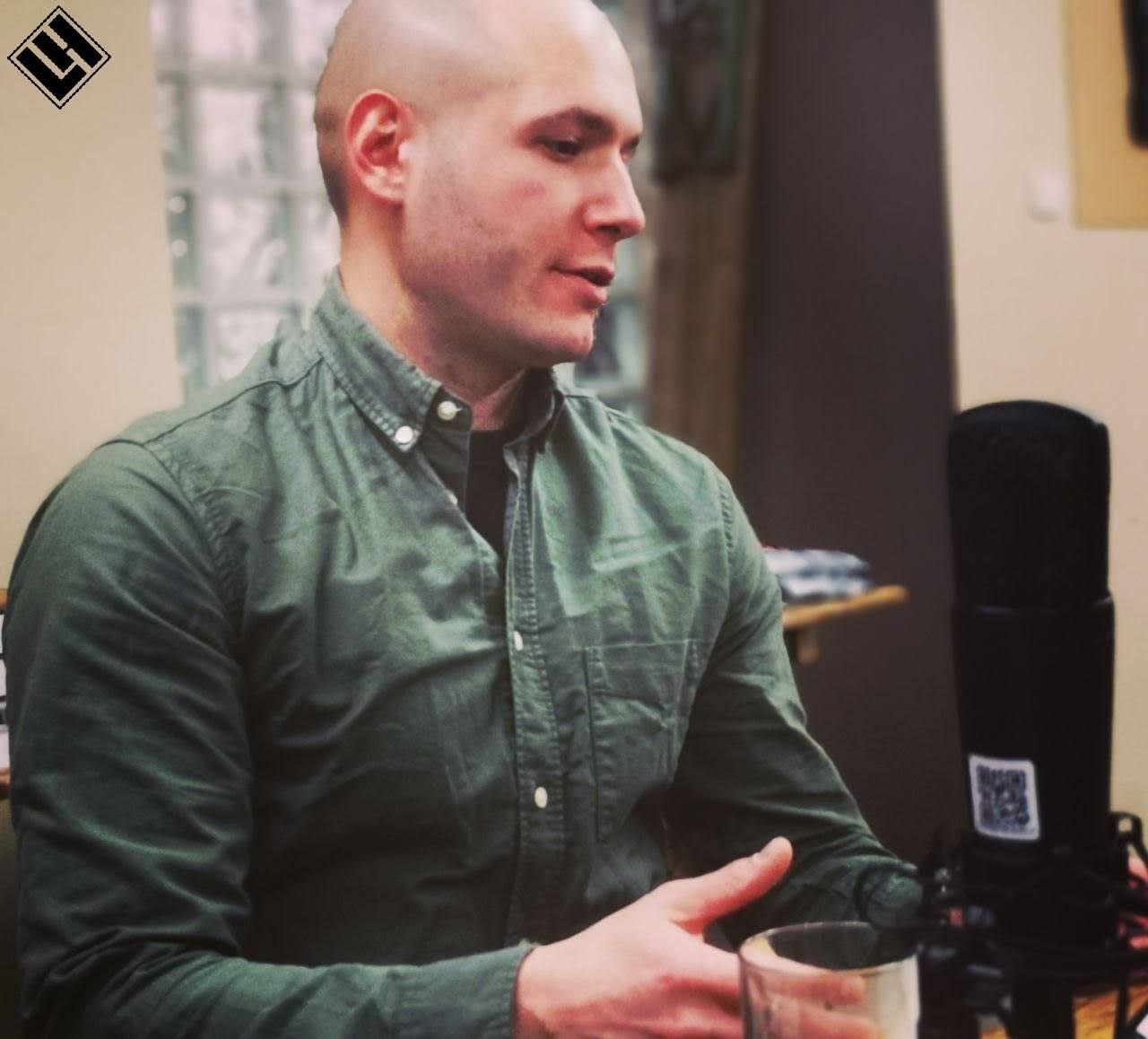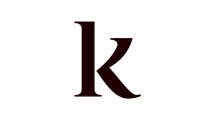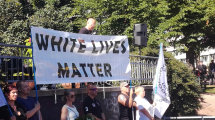Béla Incze on Unkarin legioonan perustajajäsen ja kansallismielinen aktivisti, joka esiintyy toista kertaa Suomessa. Incze on huhtikuussa järjestettävän Awakening-konferenssin toinen puhuja. Ilmoittaudu konferenssiin osoitteessa awakeningfinland@protonmail.com

Tervehdys Bela! Haluaisitko esitellä itsesi suomalaisille lukijoille ja avata hieman henkilöhistoriaasi. Milloin koit poliittisen heräämisesi ja oletko aina ollut tiukan linjan nationalisti?
Tervehdys kaikille suomalaisille kansallismielisille! Haluan heti alkuun kiittää sinua tästä haastattelusta sekä uudesta kutsusta Suomeen (Legio Hungaria vieraili Suomessa Operaatio Kotkanpesä-seminaarissa toukokuussa 2023). Se on meille suuri kunnia.
Mitä tulee itse kysymykseen: Olen 35-vuotias kolmen lapsen isä, sekä yksi Unkarin Legioonan perustajajäsenistä sekä sen nykyisistä johtajista. Sain oikeistolaiset ja konservatiiviset vaikutteet perheeltäni heti syntymästäni lähtien. Aloitin aktivistina toimimisen vuoden 2004 aikoihin, mutta silloin se tapahtui pitkälti alakulttuurin piirissä. Vuonna 2007 liityin nuorisotoimintaan, jonka Budapestin päälliköksi kohosin, ja sen jälkeen itse kattojärjestön johtajaksi. Vuonna 2018 liikkeessä ilmeni muutamiakin ongelmia ja poliittisessa kentässä alkoi esiintymään muutoksia. Enemmistöläiset, minä mukaan lukien, päättivät erota liikkeestä, ja perustaa Unkarin Legioonan muutaman muun järjestön kanssa, joka kykenisi vastaamaan modernin ajan haasteisiin.
Mitkä periaatteet muodostavat maailmankatsomuksesi perustan ja kuinka ne näkyvät jokapäiväisessä elämässäsi?
Voin vastata tähän kolmella sanalla, jotka ovat liikkeeni periaatteita: traditio, identiteetti ja yhteisö.
Traditiolla tarkoitamme ideoita ja arvoja, jotka ovat riippumattomia ajasta ja paikasta, eikä niihin vaikuta aikalaistrendit.
Identiteetillä tarkoitamme kulttuurillista ja kansallista olemusta, mutta voimme samalla todeta, että uskomme myös laajempaan eurooppalaiseen sivilisaatioon, jota erilliset kansakunnat eivät hajota, vaan ilmaisevat omalla monimuotoisuudellaan.
Yhteisö tarkoittaa maailmankatsomusta, perhettä ja toveruutta.
Kuten lukija voi nähdä tästä lyhyestä esittelystä, arvojen moniulotteisuus ei mahdollista sitä, että maailmankatsomus, aktivismi ja siviilielämä voisivat olla erotettavissa toisistaan. Me itse kutsumme tätä maailmankatsomustamme militantiksi konservatismiksi.
Tulevan konferenssin teema on ”Nova Europa – Eurooppa liberaalin hegemonian jälkeen”. Mitkä asiat tekevät liberaaleista arvoista niin vaarallisia, ja minkälaista vaihtoehtoa niille tulisi tarjota? Mikä on oman esityksesi teema?
Meidän mielestämme kaikki demokratiat on rakennettu epärehelliselle ja tekopyhälle maaperälle. Annan tästä esimerkin: se tarjoaa yhdenvertaisen äänen yhteisöille, jotka eivät tiedä edes perusasioita poliittisten termien merkityksistä. Demokratiassa ei ole kovinkaan tärkeää saada koko yhteiskuntaa tärkeiden kysymysten äärelle, kunhan osaamattomalle massalle annetaan lisää oikeuksia, eikä niille, joilla on parempi ymmärrys käsiteltävistä asioista.
Kaikista epäonnistumisistaan huolimatta tämä on todellisuutta modernissa maailmassa, ja sille meidän täytyy tehdä jotain. Henkilökohtaisesti en näe järkeä poliittisten puolueiden perustamisessa ja parlamentaarisessa vaikuttamisessa. Sillä saa aikaiseksi vain pieniä voittoja valtavalla vaivannäöllä, eikä se riitä tekemään maailmastamme parempaa paikkaa. Uskon puolueista riippumattomaan toimintaan, jota voidaan toteuttaa metapoliittisella tasolla. Käytännössä sitä toimintaa voidaan tehdä sosiaalisissa ympäristöissä, arkisessa poliittisessa keskustelussa ja kadulla.
Tämän työn ansiosta liike on paljon kyvykkäämpi toimija kuin puolue. En kuitenkaan sano, etteikö poliittinen puolue voisi olla hyödyllinen joissain tilanteissa, mutta se ei lukeudu omiin mielenkiinnon kohteisiini, enkä tule puhumaan niistä asioista myöskään tulevassa konferenssissamme.
Olet pitkän linjan aktiivi Unkarin Legioona-nimisessä järjestössä. Kerro meille lisää tästä ryhmästä sekä sen pitkän aikavälin päämääristä. Minkälainen visio sillä on Unkarin tulevaisuudelle? Miten liikkeenne suhtautuu Orbaniin ja valtapuolue Fidesziin?
Jotten toistaisi itseäni, joudun vastaamaan tämän kysymyksen viimeiseen osioon. Nykyisin hallitseva hallitus ja sen pääministeri ovat yksinkertaisia populisteja, kuten Donald Trump. Heillä ei ole takanaan maailmankatsomusta, ja he ovat johdonmukaisia ainoastaan yhdessä asiassa: he vainoavat todellista oikeistoa. Fideszin toimintamekanismi on seuraava: he käyttävät suuren määrän rahaa galluppien järjestämiseen, jotka ovat hyvin tarkkoja. He arvioivat kunkin aiheen tärkeyttä, jonka jälkeen he valmistelevat kommunikaatiostrategian saavuttaakseen harmonian enemmistön kanssa. Fidesz vaikuttaa oikeistopuolueelta ainoastaan siksi, koska enemmistö unkarilaisista, johtuen historiallista syistä, on maailmankatsomukseltaan kommunismia vastustavia konservatiiveja. Orban hallitsee tätä enemmistöä propagandallaan. Käytäntö ei kuitenkaan vastaa propagandaa. Otetaan esimerkiksi rajakontrolli: muurissamme on suuria aukkoja, joista sadat ja jälleen sadat laittomat maahantunkeutujat pääsevät tulemaan legendaarisen raja-aitamme ja hallinnollisten esteiden läpi. Ne toki hidastavat niitä, muttei estä niiden tuloa.
Tiivistäen voisin sanoa, että he ovat pinnallisia populisteja, jotka nöyristelevät tasapuoleisesti länsiliittoumalle ja idän bolsevikeille, samaan aikaan kun unkarilaisille he julistavat kansallista riippumattomuutta. Vähän aikaa sitten maahamme perustettiin ”kansallisen suvereniteetin puolustusvirasto”. Kun sen perustamisesta tiedotettiin, kysyin kyynisesti: onkohan laitoksen virallinen kieli englanti, heprea vai venäjä?
Unkarin kansallinen identiteetti on aina ollut mielenkiintoinen kysymys, sillä osa maan älyköistä on ylistänyt turanismia ja toiset taasen laajempaa eurooppalaista/valkoista identiteettiä. Mikä on teidän mielipiteenne tästä asiasta, näettekö unkarilaiset turanilaisena vai eurooppalaisena kansana, vai jonkinlaisena sekoituksena molempia?
Voimme sanoa varmuudella, että unkarilainen valtakunta on sijainnut Keski-Euroopassa jo 1100 vuotta sitten. En ole arkeologi tai historioitsija, mutta totta kai olen tietoinen niistä teorioista, joiden mukaan esi-isämme olivat asuneet Euroopassa paljon tätäkin pidemmän ajan, sekä niistä, joiden mukaan Venäjän federaation itäiset osat tai tietyt alueet Lähi-Idästä olisivat unkarilaisten alkuperäisiä kotimaita. Muinainen historia on toki mielenkiintoista, mutta toisaalta hyvin hämärää aluetta, sillä monet itseoikeutetut ”tutkijat” ovat pyrkineet täyttämään kansamme historiallisia aukkoja omilla fantasioillaan. He aiheuttavat suurta vahinkoa. En halua mennä aiheeseen syvemmin, sillä en ole aiheen ammattilainen, ja minun mielestäni unkarilaisten genetiikan ja kulttuurin kannalta viimeiset 1000 vuotta ovat ne, jolla on oikeasti merkitystä.
Näen unkarilaisen kansan eurooppalaisena kansana, tarkemmin ottaen kulttuuria luovana kansana, joka on ollut luomassa vanhaa maanosaa vuodesta 895 lähtien muiden muinaisten eurooppalaisten kanssa.
Mikä on maahanmuuton nykyinen mittakaava Unkarissa, ja minkälaisen väestöllisen haasteen se aiheuttaa unkarilaisille lähitulevaisuudessa?
Kuten mainitsin aiemmin, hallitus pysäytti laittoman maahantulon ainoastaan retorisella tasolla, mutta sitä tapahtuu siitä huolimatta jatkuvasti. Monissa tapauksissa Unkari ei ole tulijoiden viimeinen päämäärä. Tämän lisäksi maahan on alkanut saapumaan työperäisiä siirtolaisia, pääosin Kaukoidästä, joiden tulolla on hallituksen siunaus. Sisäministeriön mukaan suurin osa työperäisistä siirtolaisista saapuu maahamme Intiasta, Kiinasta, Vietnamista ja Turkista, mutta tämä ei vastaa enää todellisuutta, johtuen uusimmasta maahanmuuttoaallosta, joka tulee pääosin Filippiineiltä. Suuret yritykset värväävät työntekijöitä kehitysmaista ja tuovat niitä maahamme hallituksen tuella. Meillä ei ole asiasta aiempaa kokemusta, sillä ilmiö on meille vielä uusi. Trendi on kuitenkin selvä: monet yritykset irtisanovat unkarilaisia työntekijöitä ja korvaavat heidät aasialaisilla. Kaupungeissa on esiintynyt muutamia pienempiä yhteenottoja, ja media on uutisoinut myös työperäisten siirtolaisten tekemistä seksuaalirikoksista, mutta tämä on kaikki vasta alkua. Tulevaisuutemme ei näytä kovin kirkkaalta.
ENGLISH VERSION:
Hello Bela! Would you like to introduce yourself to the Finnish readers and tell us something about your personal history. When you had your political awakening, and have you always been hardcore nationalist?
Greetings to all Finnish nationalists. First of all I have to thank you for the interview and to invite us again to your country. It is a great honour for us.
About the question: I am 35 years old, father of three, one of the founder and the leader members of Legio Hungaria. Mostly I got right wing and conservative ideas from my family since I was born. I began my movement activity around 2004, but then it was mostly on the subcultural level. In 2007 I joined to a youth movement, which I became the leader in the capital city, then became leadership member and finally the leader. In 2018 after several problems inside the movement and after the whole political sphere beginig to change, with 2/3 of the movement we decided to quit and found Legio Hungaria with severeal comrades from other movements, which could bring answers for the questions of the present times.
Which principles are the most important part of your worldview and how do they affect your daily life?
I can answer with three worlds for it, which words are the bases of our Movement: Tradition, Identity, Community.
Under Tradition we mean the ideas and values which are independent from time and space, which are not effected by the spirit of the times.
Identity means the cultural and national characteristics, but we can mention here that we belive in a collective european culture and civilization, where the nations not dissolve, but they could present their own diversity and character.
Community means both the bounds of the worldview, family and comradeship.
As one can see from this short presentation, the complexity of the values does not allow that the worldview, the movement and the private life could be seperated. We call this worldview of ours as militant conservativism.
Theme of the upcoming conference is “Nova Europe – Europe after the Liberal hegemony”. What makes liberal democratic values so dangerous and what kind of alternatives we should offer to our own people? What is the theme of your own presentation?
We can tell about every democracy that it is based on a dishonest and hypocrite ground. Just to bring one example: it provides the equality of votes in societies which don’t even know the basic ideas behind of the political terms. In the practice it is not important to get the whole society involved in the important questions, but to provide more rights for the incompetent masses and not for those who could be competent in these topics.
We have to see that beside its all failures this is the reality of the modern world, which we have to do something about. Personaly I don’t see the reason to found a political party and to do parlamental work. Small progresses only can be achived by incredible amount of work, but it won’t be enough to make the world a better place. I believe in actions independent from the partypolitics, which can be realized in metapolitical level. In the practice it could be shown in the cultural space, the political commontalk and in the streets. For a work like this a movement is much more capable then a party.
However I can not say that there is not to have a political party practical in some situations, but its not my personal sphere, I won’t speak such topics on the conferency.
You are active member of the group named Legio Hungaria. Tell us something about the group and its long-term goals. What kind vision it offers for the Hungarian future? How your group sees Orban and the ruling Fidesz party?
To not to repeat myself I have to answer the last part of the question. The currently regnating government and the prime minister are simple populists, such as Donald Trump. They do not have any worldview, they are not consistent just in one thing: they are persecuting the true right wing or if you like the militant conservativists. The operating mechanism of the Fidesz in short terms is the following: they spend a huge amount of money on public opinion researches, which are very accurate. They „measure” every important topic, then they build their communication strategy to be in harmony with the majority. Fidesz is only seemed to be a right winged party because the majority of the hungarian society – due to historical reasons – is anticommunist and conservative by its nature, and Orban is ruling this majority by propaganda. However the practice does not follow the propaganda. For one example the border defense: there are gaps on the shield where 100 from 100 illegal migrants could get through on the legendary fence and on the bureaucratic system too. In fact it slows them down, but do not stops them.
Long story short I could say that they are unprincipled populists who are parallel serv the atlantists and the eastern neo-bolsheviks, while for the hungarian society they shout the great slogan: „national sovereignty”. In the recent past the Sovereignty Defence Office was established. When it was announced I asked cynically: will be the english, hebrew and russian the official command languages in it?
Hungarian national identity has always been interesting topic, as some of the intellectuals have embraced Turanism and other people wider European/White identity. What is your position of the matter, do you see Magyars as a Turanian or European nation, or some kind of mix between both?
We can tell it for sure that history and statehood of the hungarians in Central-Europe could be traced back 1100 years. I am not an archeologist, nor a historian but of course I know those theories which say the our ancesters were present in Europe for a much longer time, and those which say that the eastern parts of the Russian Federation or the parts of the Middle-East was the original homeland of the hungarians. The ancient history is very exciting but it is very swampy teritory aswell, because it become a topic for many self-made „researchers”, who are try to replace the missing parts of the history with their own fantasy. They make huge damages. I don’t want to go too deep in it, because I am not an expert and I think that according to the hungarian culture and genetics, the last 1000 years are important.
So I see us, the hungarian volk as europeans, moreover a culture creator volk, which forms the Old Continent since 895 with other ancient european nations.
What is the current volume of immigration in Hungary, and does it cause demographic threat to the Hungarian people near future?
As I mentioned earlier the govenrment just stopped the illegal migration in a the rhetorical level, but its continously happening. In most cases the final destination is not our country. However beside this in the recent past the ratio of the legal economical immigration begin to merge mostly from the Far-Eastern countries, and this is the will of the government. According to one of the mesuration of the Ministry of Interior Affairs, most of the economical immigrants come from India, China, Vietnam and Turkey, but this is not the standard anymore, because the newest wave of the economical immigration is more recent. Most of them come from the Philippines, but huge companies search for other emplyees from other third world countries, and they bring them here with the support of the state. We don’t have much direct experience because its a new prhenomenon, but its clear: for economical preferences many company fire hungarian employees and apply new ones to their places from the Far-East. There were several smaller conflicts in towns, and the news of sexual violence linked to the economical immigrants were also in the media, but this is just the beginning. So our outlooks are not very bright.
____
Tuukka Kuru










